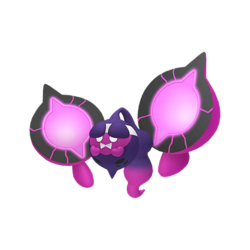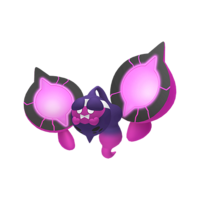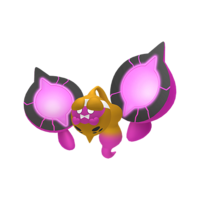From Bulbapedia, the community-driven Pokémon encyclopedia.
Pecharunt (Japanese: モモワロウ Momowarō) is a dual-type Poison/Ghost Mythical Pokémon introduced in Generation IX, in The Indigo Disk.
It is not known to evolve into or from any other Pokémon.
It is implied to be the leader and trio master of the Loyal Three.
Biology
Pecharunt is a small, mochi-looking Pokémon. It has two forms it takes during and outside of battle. The first form resembles an upside-down peach-colored dark pink. It has a black circle at the center with white frown-looking white eyes. The second form when it opened up revealed a dark purple body with a small light purple face two white eyes and a ribbon-shaped mouth. It has a white circle on its head with two dark purple circles-like eyelashes. It has a purple ponytail with a light pink end. The bottom has a horn with black paw-like symbols on each side. It has two small dark purple hearts for hands. The other shell becomes two floating arms. The inside of the shell is black with 5 light purple lines connecting to a bright circle with two horns from top to bottom.
Pecharunt feeds the toxic mochi it produces to other Pokémon and humans. The mochi draws out other's desires and potential abilities, but others who taste it become chained to its will and become controlled. It stores its poison in its peach-shaped shell. It can disguise itself as toy and remain asleep for many years. It can be awaken by the Mythical Pecha Berry.
Humans under Peachrunt’s control have their eyes purple and purple aura. The possessed humans also holds their arms while preforming the chicken dance, repeating the words Moochi constantly. Though on some cases like with Neomona, the possessed human can say more than one line. It can even command humans or even Pokémon to fight for it in Pokémon battles. Pecharunt is capable of controlling multiple humans at once. It relies on others to fight for it due to its size. However, Pecharunt will fight back if mind controlled minions fall it.
It is implied to be the creator and Trio Master of the Loyal Three, having transformed these three Pokémon using the Toxic Chains it creates. The trio follow Pecharunt loyally. It was with the trio when they encounter Ogerpon and its partner.
Pecharunt is the only known Pokémon capable of learning the move Malignant Chain. It is also the only known Pokémon that can have Poison Puppeteer as an Ability.
In the anime
Major appearances
Minor appearances
In the manga
In the TCG
- Main article: Pecharunt (TCG)
Game data
Pokédex entries
| This Pokémon was unavailable prior to Generation IX.
|
| Generation IX
|
|
Paldea
#—
|
|
Kitakami
#—
|
|
Blueberry
#243
|
| Scarlet
|
It feeds others toxic mochi that draw out desires and capabilities. Those who eat the mochi fall under Pecharunt’s control, chained to its will.
|
| Violet
|
Its peach-shaped shell serves as storage for a potent poison. It makes poisonous mochi and serves them to people and Pokémon.
|
|
|
Game locations
| This Pokémon was unavailable prior to Generation IX.
|
|
|
In side games
Held items
Stats
Base stats
| Stat
|
Range
|
| At Lv. 50
|
At Lv. 100
|
88
|
|
148 - 195
|
286 - 380
|
88
|
|
83 - 154
|
162 - 302
|
160
|
|
148 - 233
|
292 - 460
|
88
|
|
83 - 154
|
162 - 302
|
88
|
|
83 - 154
|
162 - 302
|
88
|
|
83 - 154
|
162 - 302
|
Total: 600
|
Other Pokémon with this total
|
- Minimum stats are calculated with 0 EVs, IVs of 0, and (if applicable) a hindering nature.
- Maximum stats are calculated with 252 EVs, IVs of 31, and (if applicable) a helpful nature.
|
Type effectiveness
| Under normal battle conditions in Generation IX, this Pokémon is:
|
|
|
|
|
|
|
|
|
|
|
|
|
Learnset
Pecharunt is available in Scarlet and Violet Version 3.0.0+.
|
|
|
|
- Bold indicates a move that gets STAB when used by Pecharunt
- Italic indicates a move that gets STAB only when used by an Evolution of Pecharunt
|
|
|
|
|
- Bold indicates a move that gets STAB when used by Pecharunt
- Italic indicates a move that gets STAB only when used by an Evolution or an alternate form of Pecharunt
|
|
|
|
|
- Moves marked with an asterisk (*) must be chain bred onto Pecharunt
- Bold indicates a move that gets STAB when used by Pecharunt
- Italic indicates a move that gets STAB only when used by an Evolution of Pecharunt
|
Side game data
Pokémon GO
| File:GO1025.png
|
Base HP: 204
|
Base Attack: 181
|
Base Defense: 273
|
| Egg Distance: N/A km
|
Buddy Distance: 20 km
|
Evolution Requirement: N/A
|
| Fast Attacks:
|
| Charged Attacks:
|
|
|
Evolution data
Sprites
| This Pokémon was unavailable prior to Generation IX.
|
|
|
|
|
Trivia
Origin
Pecharunt, together with Okidogi, Munkidori, Fezandipiti, and Ogerpon, may reference the Japanese folktale of Momotarō. The tale relates the titular Momotarō, a boy born from inside a peach, who traveled alongside a talking dog, monkey, and pheasant to fight a band of oni (a Japanese folkloric creature commonly equated to ogres in translations). Pecharunt appears to represent Momotarō himself. Its outer shell covering resembles a bisected peach or Pecha Berry, referencing how Momotarō was found as a baby inside a cut peach, also resembling a peach pit.
Name origin
Pecharunt may be a combination of peach, Pecha Berry and runt or petulant.
Momowarō may be a combination of 桃太郎 Momotarō, 桃 momo (peach), and 悪し waroshi (bad or inferior; the classical Japanese form of 悪い warui) or 和郎 warō (boy).
Dokutaro may be a combination of Doku (the Japanese word for poison) and Tarō (a Japanese full or part of a name meaning eldest son. Though most likely comes from Momotarō as well)
In other languages
| Language
|
Title
|
Meaning
|
 Japanese Japanese
|
モモワロウ Momowarō
|
From 桃太郎 Momotarō, 桃 momo, 悪し waroshi, and 和郎 warō
|
 French French
|
Pêchaminus
|
From pêche, Baie Pêcha, and minus
|
 Spanish Spanish
|
Pecharunt
|
Same as English name
|
 German German
|
Infamomo
|
From infam, īnfāns and 桃 momo
|
 Italian Italian
|
Pecharunt
|
Same as English name
|
 Korean Korean
|
복숭악동 Boksung-akdong
|
From 복숭아 boksung-a and 악동 (惡童) akdong
|
 Mandarin Chinese Mandarin Chinese
|
桃歹郎 Táodǎiláng
|
From 桃太郎 Táotàiláng, 桃 táo, and 歹 dǎi
|
 Cantonese Chinese Cantonese Chinese
|
桃歹郎 Tòuhdáailòhng
|
From 桃太郎 Tòuhtaailòhng, 桃 tòuh, and 歹 dáai
|
|
|
|
|
|
|
|
Related articles
References
-->
External links

|
This Pokémon article is part of Project Pokédex, a Bulbapedia project that aims to write comprehensive articles on each Pokémon species, as well as Pokémon groups and forms.
|
 For other sprites and images, please see Pecharunt images on the Bulbagarden Archives.
For other sprites and images, please see Pecharunt images on the Bulbagarden Archives.



